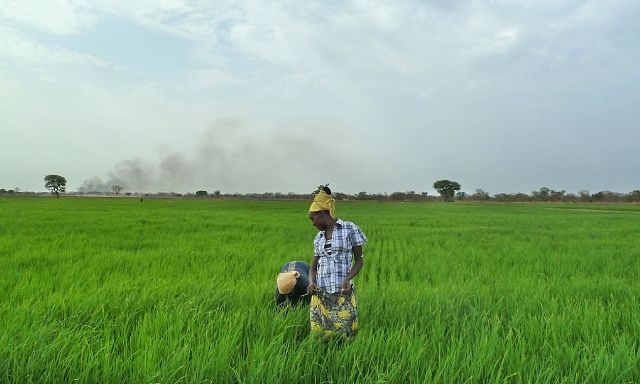 Employees of Saudi Star rice farm work in a paddy in Gambella, Ethiopia. (Photograph: AFP/Getty Images)
Employees of Saudi Star rice farm work in a paddy in Gambella, Ethiopia. (Photograph: AFP/Getty Images)
By Ben Rawlence
Tuesday 12 January 2016
One day in late 2010, a farmer – I will call him Opik – woke up in his village in the remote Ethiopian province of Gambella. In this lush lowland area of savanna bordering South Sudan, the semi-nomadic Anuak people have lived for centuries, cultivating sorghum and maize, swimming in the river and gathering nuts, berries and fruits from the trees and wild honey from the forest. “It was paradise,” Opik recalled.
The Anuak have an intimate relationship with their landscape. Their highest traditional authority is a spiritual leader called the wat-ngomi, who must sanction any human intervention in nature. Some trees are deemed sacred and cannot be cut down. Spirits live in certain sites and even the boundaries of their territory are inscribed with religious meaning. Everyone knows where the land of one community ends and that of another begins. This intimacy is reflected in their language: “How are you?” in the Anuak language is piny bede nidi, which literally translates as “how is the earth?” The reply is piny ber jak (“the earth is fine”) or piny rac (“the earth is bad”).
That morning, the earth was bad. Officials from the regional government in Gambella, accompanied by soldiers from the Ethiopian National Defence Force (ENDF) had come to tell Opik and the other inhabitants of the village to leave. It was not the first time they had come. Earlier in the year there had been several meetings. The government had arrived with police and militias and informed the residents that they were to be moved to a new location. There was a national plan called “villagisation” and Gambella was in the first phase.
The officials had explained that the purpose of the relocations was to cluster communities together in places where the government promised to provide a new school, a clinic, a borehole and a grinding mill. In time, the new settlements would be better-connected to the rest of the country via new roads, they said. The officials also promised to provide a grader to clear the land at the new site and make it ready for planting.
—
Join the conversation on Twitter and Facebook.

























